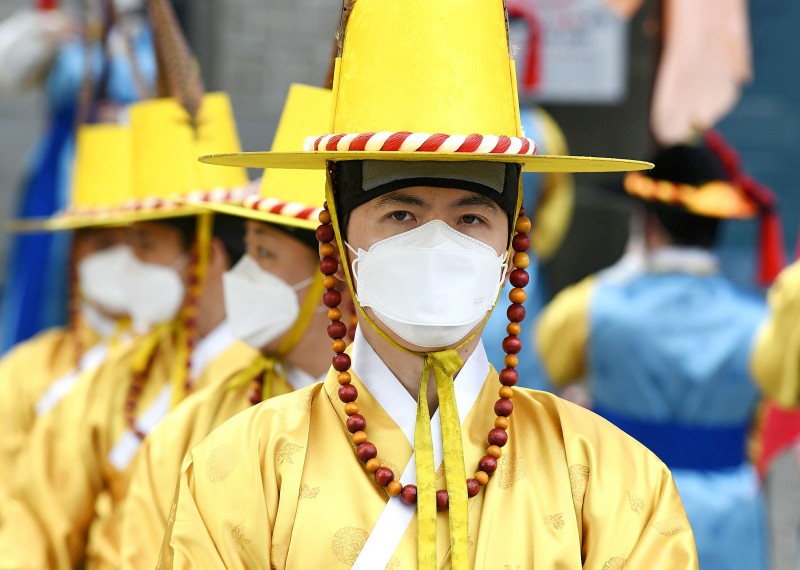《TAIPEI TIMES》 Coronavirus death toll rises to 170 in China

Palace guards in traditional Korean costume wear face masks as they perform for tourists at Deoksugung Palace in Seoul, South Korea, yesterday. Photo: AFP
/ AP, BEIJING
The death toll yesterday rose to 170 in the 2019 novel coronavirus outbreak in China, as foreign evacuees from the worst-hit region begin returning home under close observation and world health officials expressed “great concern” that the disease is starting to spread between people outside of China.
Yesterday’s figures covered the previous 24 hours and represented an increase of 38 deaths and 1,737 cases to 7,711.
Of the new deaths, 37 were in the epicenter of the outbreak in Hubei Province and one was in Sichuan Province.
The news came as the 195 Americans evacuated from the epicenter of the outbreak in Wuhan were undergoing three days of testing and monitoring at a southern California military base to make sure that they do not show signs of the virus.
A group of 210 Japanese evacuees from Wuhan landed at Tokyo’s Haneda Airport on a second government chartered flight, the Japanese Ministry of Foreign Affairs said.
Reports said that nine of those aboard the flight showed signs of cough and fever.
Three of the 206 Japanese who returned on Wednesday tested positive for the coronavirus, Japanese Prime Minister Shinzo Abe said in parliament.
Two of them showed no symptoms of the disease.
The Japanese Ministry of Health, Labor and Welfare earlier confirmed a second suspected human transmission in a tour bus guide who had escorted a group of travelers from Wuhan. The bus driver was also infected. Neither had traveled to China.
France, New Zealand, Australia, Singapore and other nations were also pulling out their citizens or making plans to do so.
In South Korea, residents of two cities where quarantine facilities are being prepared threw eggs and plastic water bottles at government officials to protest plans to isolate the 700 South Koreans the government plans to evacuate from China and isolate in their neighborhoods.
US President Donald Trump has been relatively tight-lipped about the crisis.
Aides and confidants say Trump’s careful approach is part of a political strategy to avoid upsetting the stock market or angering China by calling too much attention to the virus or blaming Beijing for not managing the situation better.
“We’re very much involved with them, right now, on the virus that’s going around,” Trump said of China before signing a trade deal at the White House on Wednesday.
Trump said that he had discussed the situation with Chinese President Xi Jinping (習近平).
“We’re working very closely with China,” he added.
There have been just five confirmed cases of the virus in the US.
Amid reports of shortages in food and daily necessities in hot-spot areas in China, authorities are “stepping up efforts to ensure continuous supply and stable prices,” Xinhua news agency reported.
It cited Chinese Ministry of Commerce data showing reserves in Wuhan can ensure a secure supply of rice and cooking oil for more than 15 days; pork and eggs for more than 10 days; and vegetables for about five days.
The government has offered no estimates as to when it can contain the outbreak, although some specialists have speculated that the spread of the disease would reach its peak in about two weeks.
The WHO said that the few cases of human-to-human transmission of the virus outside China — in Japan, Germany, Canada and Vietnam — were of “great concern” and were part of the reason the UN health agency was yesterday reconvening a committee of experts to assess whether the outbreak should be declared a global emergency.
In a report published on Wednesday, Chinese researchers suggested that person-to-person transmission among close contacts occurred as early as the middle of last month.
“Considerable efforts” will be needed to control the spread if this ratio holds up elsewhere, researchers wrote in the report, published in the New England Journal of Medicine.
They reported that the average incubation period was five days.
新聞來源:TAIPEI TIMES

















